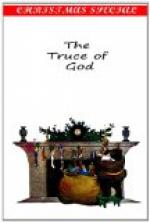With Henry were the bishops of Basle and Lausanne with their men-at-arms, the Count Palatine Herman with all Franconia, Marquard of Carinthia, and Lutold, his son. Many recreant Bavarians were around him, and even Suabia raised her arm against her noble duke, in the person of Werner, Archbishop of Strasburg. There, too, were found Ulrich of Eppenstein, Arnaud of Lentzburg, Ulrich of Bregenz, Lutold of Dillingen, the counts and prelates of the house of Welschneuenburg, Egina of Achalm, and Werner of Gruningen. But conspicuous, even amid that high-born and martial group, stood the Duke Godfrey of Bouillon and Frederick of Hohenstaufen.
Rodolph was surrounded by Altman of Constance, and the mitres of Coire, Rheinau, Stein, Wuertzburg, and Worms; he could touch the hands of Eckhard of Richenau, of the Abbot of the Convent of All Saints at Schafhouse, and of William de Hirschau, the most exemplary man of his day. Welf, Otto of Nordheim, Berthold of Carinthia, and Hugo, Count Palatine of Tuebingen, were ready to support him with their lives, as they marched on proudly at the head of their vassals and soldiers. Glittering at his side were raised the lances of Marquard of Bregenz, Hartman of Dillingen, Burchard of Nellemburg, Cuno and Lutold of Achalm, Werner of Hapsburg, Adalbert of Calm, Albert of Hers, and Sandrit of Stramen.
At the moment the advancing columns halted, the legates of Gregory appeared in front of the army and imparted the Papal benediction to all who had taken up arms against the enemy of the Church and of the liberties of Germany. As if a thunderbolt had stricken them down, the soldiers sank simultaneously upon their knees, and, with their heads bent upon their hearts, received the boon so dearly prized. While they were yet kneeling, the clerks began to intone the eighty-second Psalm, and the solemn strains could be heard all along the ranks. How sad was the thought, that this calm music was but the prelude to the groans of the dying and the hoarse shouts of blood-stained victory! As the army rose at the last note of the Psalm, the clash of steel, instead of the mournful chant, was heard along the line.
Rodolph, pale and thoughtful, but calm and dignified, rode through his columns, uttering brief expressions of encouragement and confidence, which were answered by cheers that made the welkin ring. When he had gained an eminence which commanded a view of both armies, a messenger, darting from his side, flew like an arrow toward the column of Welf of Bavaria. After the lapse of a few minutes, the Bavarians had turned the morass, and were almost within striking distance of the enemy. Without moving from his position, Frederick of Hohenstaufen waited the assault. The next instant the Bavarians had encountered the Bohemians hand to hand. For a time the combat seemed equal, but at length the division of Welf could be seen slowly falling back. The Suabian nobles, who had hitherto watched the contest in silence and




